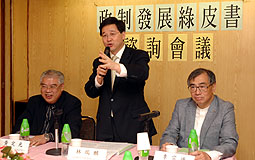
|
| Consensus urged: Secretary for Constitutional & Mainland Affairs Stephen Lam discusses the Green Paper on Constitutional Development at a seminar. |
The Government has not taken a view on the key issues set out in the Green Paper on Constitutional Development, Secretary for Constitutional & Mainland Affairs Stephen Lam says, adding that universal suffrage is achievable once consensus is attained on these issues.
He urged political parties and the community at large to support related policies and initiatives, so that the city's democratic system can progress in accordance with the Basic Law.
Introducing the green paper at a seminar today, Mr Lam said the Government has been very open in setting out all key issues in it.
Universal suffrage achievable
"The Government has not taken a view on these issues. However, once consensus is attained on the key issues, universal suffrage is achievable. Our hope is that thereafter candidates standing for Chief Executive and LegCo elections will focus their manifestos on improvements to the economy, social services and livelihood issues - much in the same way as western politicians run their election campaigns. Hong Kong will no longer need to agonise unceasingly over the issue of constitutional development," he said.
He said in attaining universal suffrage and designing a model for implementing it, Hong Kong must abide by the Mainland's basic policies regarding the city and the four principles on constitutional development under the Basic Law.
These include meeting the interests of different sectors of society; facilitating the development of the capitalist economy; gradual and orderly progress; and developments being appropriate to the actual situation in Hong Kong.
Suggested priorities
Mr Lam said at this stage, the community should first strive to agree on the number of candidates which the nominating committee should put forth. The public will then have a clearer idea of the scale of the general election. Thereafter, detailed nomination procedures can be discussed and agreed upon.
On the further development of the political appointment system, Mr Lam said proposals for creating two additional tiers of political appointment will be put forth later this year. The system of permanent secretaries will stay, and the apolitical civil service will provide administrative continuity, he added.
|